
- Home
- Memories
- Scrapbook ▽
- Topics ▽
- People ▽
- Events
- Photos
- Site Map
- Timeline
Page updated 12th March 2014
Return to Cinema of Exeter
Also see Rock and Pop at Exeter
and ABC pop and rock gigs 1960s
 Replacing
the New London Inn
Replacing
the New London InnThis cinema is fondly
remembered by many Exonians who visited in the war years to forget the
bombing and during the post war period, to enjoy a Saturday night at
the pictures. Set back from the High Street, it was designed by W R
Glen in 1936, in a Thirties, art deco style and was considered to be
Britain's most technologically advanced cinema to date. Commissioned by
Associated British Cinemas who were formed in 1928, the company also
ran cinemas under the Regal and Ritz names. Their new cinema would be
built on the site of the New London Inn, which they purchased on
29 September 1935 and closed on 2 November 1935.
Built of
contrasting brick and plaster, by Brazier and Son of Southampton, the
front echoed the lines of the bridge of a ship. To the right of the
entrance, and integral with the cinema, was the New London Inn, named
after the well loved inn that was built in 1793-94 and demolished
in February 1936, ready for the cinema's construction. The ABC was well
suited to the existing shape of the land on which it was built, with
the front curving around the corner on the right side, much like the
New London Inn. The gigantic steel girder used in the construction was
believed to have been the largest in the city with a length of 100ft,
depth of 8 ft, width of 2 ft and weighing 25 tons.
The
auditorium seated 1224 in the stalls and 734 in the circle. Projection
was with three Ross kinematograph machines and a sound
system by Western Electric, later RCA. It also had the very latest
in 1930's air-conditioning installed. It was estimated to have cost
between £6,000 and £7,000 to build. Associated British Cinemas Ltd
appointed Mr E V S Forgham as the manager – he had been with the
company for eight years, previously managing the Pavilion at Wylde
Green, Birmingham.
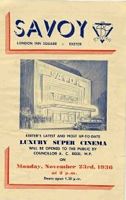 The new cinema was opened by Councillor Arthur Reed
on the 22nd November 1936 and the first films to be screened to the
public on Monday 23rd
November 1936 were Shirley Temple in 'Captain January' and 'A Star Fell
from Heaven'.
The 3 manual and 6 rank, Compton 'Super' Organ was played by Reginald
Porter Brown from the Regal, Torquay. The regular organist was Harold Stringer, who went
on to perform on a regular basis, including broadcasting concerts
for the BBC. His signature tune was Glorious Devon, with which he always opened the interlude.
The new cinema was opened by Councillor Arthur Reed
on the 22nd November 1936 and the first films to be screened to the
public on Monday 23rd
November 1936 were Shirley Temple in 'Captain January' and 'A Star Fell
from Heaven'.
The 3 manual and 6 rank, Compton 'Super' Organ was played by Reginald
Porter Brown from the Regal, Torquay. The regular organist was Harold Stringer, who went
on to perform on a regular basis, including broadcasting concerts
for the BBC. His signature tune was Glorious Devon, with which he always opened the interlude.
Glorious Devon played by Peter Holladay.
During the bombing of 4th May 1942, both the Savoy and the nearby Theatre Royal survived the raid, although most buildings around were destroyed. A report at the time stated:
"The Savoy Cinema, another steel framed structure, appears to have received 18 fire bombs on its roof. Four penetrated and were dealt with by the fire watchers, who say that here the H.E. which hit the nearby Plaza, sent up a big sheet of flame. The fire guards saved the Savoy Cinem"'.
Another report stated:
"Fire also broke out in the New London Inn which is underneath the Savoy Cinema, but was held by the fire guards and extinguished."
Although the cinema was saved, the console of the Compton Super Organ was destroyed.
 The
cinema had a popular Saturday morning film show which showed cartoons,
a cliff hanging serial and a feature, along with talent shows and
singing. Harold Stringer, the resident organist would often open the
proceedings as the huge organ rose from in front of the stage, playing
the ABC Minors Club Song.
The
cinema had a popular Saturday morning film show which showed cartoons,
a cliff hanging serial and a feature, along with talent shows and
singing. Harold Stringer, the resident organist would often open the
proceedings as the huge organ rose from in front of the stage, playing
the ABC Minors Club Song.
The ABC Minors song.
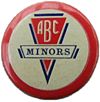
 We are the boys and girls well known as
We are the boys and girls well known as
Minors of the ABC
And every Saturday all line up
To see the films we like and shout aloud with glee.
We like to laugh and have our sing song
Such a happy crowd are we
We're all pals together
We're minors of the ABC
The last 'ABC' was to be sung as loudly as possible. Blaize Away was also played to warn staff if there was a fire in the building and an evacuation was needed.
Renamed the ABC in November 1960,
the cinema's stage was used for many pop concerts, and the Beatles gave
three shows, the first supporting Tommy Roe and Chris Montez on the
28th March 1963. Part of this show was recorded for BBC 2's 'On the
Scene'.
They then performed on 14th November 1963 and 28th
October 1964 as the headline act. The show of the 28th October was sold
out 8 weeks before. On the way to the ABC for the 8 o'clock show, the
Beatles transport got lost, causing them to miss the meeting at Honiton
with a decoy van, and arrive for the show with only minutes to go.
Ringo was asked what had happened and he remarked that the driver had
taken the wrong turning down a lane (this was before the M5 motorway)
but that they had found a very nice 'fish and chip shop'. They went on
the stage to face a theatre full of screaming fans.
Ann Moore
a young fan at the time recalled:
"I cried all the way through. Someone put
their arm around me and didn't know who it was. We couldn't really hear
the music because of all the screaming."
See the Beatles at the ABC
The next act to appear at the ABC was Cliff Richard and the Shadows on
18th November 1964. Other acts appeared on the stage over the years
including Morecambe & Wise, on the 15/16th October 1971 and Roy
Orbison and Frankie Howard.
In 1972, the ABC closed for
twinning, when the organ was removed and the interior rebuilt to give
the 504 seater ABC 1, the 128 seater ABC 2 and the stalls became a
bingo hall. On the 25th January 1973 the ABC opened with the Godfather
on screen 2. The open area at the front of the building, London Inn
Square, was a favourite meeting place for Exonians - in 1980 a vigil
was held there after the murder of John Lennon.
The ABC, was absorbed into the Cannon cinema empire, but retained its name until closure. When notice of its closure became known, a petition was organised by Winifred Walsh who collected 4,000 names, which was passed to the City Council, with no success. It projected its last film 'Personal Services' starring Julie Walters and 'Top Gun' with Tom Cruise, on 4th June 1987.
Demolition
commenced on August Bank Holiday Monday, 1987, fifty years to the day
since the Odeon in Sidwell Street opened. Just like the previous New
London Inn, many artefacts
from the demolished cinema were sold off to cinema enthusiasts. Cinema
curtains, lights and 57 solid oak fire doors were all disposed of.
Signatures left by the Beatles after one of their shows were discovered
on one of the walls near the dressing rooms.
The site was
searched by the Exeter Archaeological Unit after demolition and they
discovered city defences from the Civil War, and a late 18th-century
bakery oven.
The demolition was undertaken by Demolition Services of Leeds, often watched by a large crowd of spectators. One mishap occurred when some masonry fell, injuring a 16 year old girl.
And the replacement for the Savoy? a branch of Dillon's (now Waterstones) the book store.
Sources - Discovering Exeter, Twentieth Century Architecture by Eduardo Hoyas-Saavedra, Exeter Burning by Peter Thomas, Express and Echo 31st March 2003, the website www.albanyward.com and Don Carter for the words for the ABC Minors. © 2005 David Cornforth - not to be used without permission
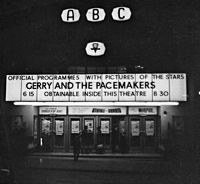
The canopy lit up for a Gerry and the Pacemakers, live show, circa 1963. © © Stan and Betty Mallett.
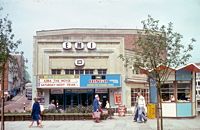
Nice photo of the EMI/ABC in the 1980s, showing London Inn Square and the McGaheys kiosk. Photo Tony Laskey.
Photos from Stan Mallett's photo essay 'Death of a cinema'.
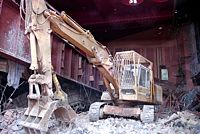
The girder, holding the circle up, had a length of 100ft, depth of 8 ft, width of 2 ft and weighed 25 tons. © Stan and Betty Mallett.
│ Top of Page │